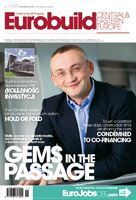It is worth being a regular visitor to railway canteens. Why? They must feed you well if the head of TriGranit eats there or at least recommends doing so while waiting for the next round of the negotiations with the public partner of a project in Poznań. But this is not the only developer I encounter at the PKP (Polish State Railways) offices on this October day. I find myself talking about PKP’s cooperation with investors with Paweł Olczyk, a PKP board member and the real estate management director, and Barbara Topolska, the general director of Neinver Polska. The projects they are carrying out together include a pioneering station and retail scheme in Katowice Ewa Andrzejewska, ‘Eurobuild CEE’: What is the first thought that comes to mind when you hear the world ‘developer’, Mr Olczyk?Paweł Olczyk, PKP board member and real estate management director: Hmm…a partner in business. At least this is how we treat the developers we are in negotiations w




























































